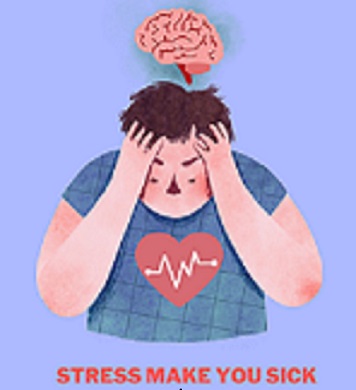The Effects of Stress on the Body
Stress is an important part of life that impacts everyone. It can arise in different scenarios, like managing finances, navigating relationships, or coping with work demands. While some levels of stress can be advantageous, excessive stress can harm both our mental and physical health. To effectively handle stress, it’s crucial to identify its signs and grasp its effects on our bodies.
What Is Stress?
Stress is the natural response of our body toward perceived or real threats. When we feel threatened, our body undergoes a chemical reaction triggering the “fight-or-flight” response. This prepares us to defend ourselves by increasing heart rate, accelerating breathing, tensing muscles, and elevating blood pressure, all in a bid to ensure survival.
Stress levels vary among individuals, with what causes stress in one person potentially not affecting another. Some individuals are more adept at managing stress than others. In small amounts, stress can aid in completing tasks and avoiding harm. For instance, it can prompt us to slam on the brakes to prevent a car collision. However, prolonged exposure to chronic stress can adversely affect our health.
Can Stress Make You Sick?
Yes, stress can make you sick. Long-term worry and chronic stress can have detrimental effects on your health. While a manageable amount of anxiety and worry can prepare us to face life’s challenges, excessive worry can have negative consequences. It can affect our ability to sleep, concentrate, and perform daily tasks. Stress can also lead to substance abuse problems and poor food choices, further impacting our health and wellness.
Prolonged stress can create unknown internal problems in the body. Elevations in cortisol levels can lead to a range of issues, including diabetes, cardiovascular disease, and chronic gastrointestinal problems. It is important to manage stress effectively to prevent these health problems.
The Role of Cortisol
During times of physical or emotional stress, the body’s sympathetic nervous system is activated. This triggers the fight-or-flight response, preparing the body to physically defend itself or flee from a threat. Physiological reactions triggered by this response include increased heart rate, rapid breathing, shortness of breath, dizziness, headache, nausea, and muscle tension.
One key hormone involved in the body’s stress response is cortisol. Cortisol signals the body to release glucose, providing energy to the muscles needed for fighting or fleeing. Although most modern stressors do not require a physical response like punching someone to defend ourselves, the body still responds in the same way. Prolonged stress leads to elevated cortisol levels, which can contribute to a range of health problems, including diabetes, cardiovascular disease, and chronic gastrointestinal issues like irritable bowel syndrome (IBS).
Consequences of Long-Term Stress
Sometimes stress is considered normal and generally not a cause for alarm, chronic, prolonged stress can lead to significant health issues. Recognizing and addressing stress is essential to prevent its negative consequences. Some of the health problems associated with long-term stress include mental health issues such as depression, anxiety, and personality disorders.
- Cardiovascular diseases including heart disease, high blood pressure, abnormal heart rhythms, heart attacks, and strokes
- Obesity and other eating disorders
- Menstrual problems
- Sexual dysfunction in both men and women
- Skin and hair problems, such as acne, psoriasis, eczema, and hair loss
- Gastrointestinal problems, including GERD, gastritis, ulcerative colitis, and irritable bowel syndrome
It is crucial to take stress seriously and seek appropriate help to manage it effectively. Recognizing stress symptoms is the first step in preventing stress overload and its associated health consequences.
Physical Symptoms Caused by Stress
Stress can profoundly affect the body, manifesting in a range of physical symptoms and illnesses. These symptoms often intensify with heightened stress levels and diminish as stress levels decrease. Understanding the impact of stress on our physical well-being is crucial for effectively managing and alleviating its adverse effects.
Fever
Chronic stress and emotional experiences can induce a psychogenic fever, unlike fevers stemming from viral infections or inflammation, as these are influenced by psychological factors. Some individuals may sustain a mild, persistent fever ranging between 99 and 100°F (37 to 38°C) due to chronic stress, while others may encounter a sudden rise in body temperature, soaring up to 106°F (41°C), triggered by emotional events. Although psychogenic fever can affect anyone experiencing stress, it is frequently observed in young women.
The Common Cold
Studies indicate that chronic psychological stress can hinder the body’s capacity to regulate its inflammatory response. Inflammation is implicated in the onset and advancement of numerous illnesses, including the common cold. Individuals enduring chronic stress exhibit heightened vulnerability to contracting a cold upon exposure to cold-causing pathogens.
Stomach Issues
Stress disrupts the normal functioning of the gastrointestinal system, leading to a range of stomach and bowel problems. This includes symptoms like abdominal pain, nausea, indigestion, diarrhea, and constipation. Furthermore, stress worsens the symptoms of irritable bowel syndrome (IBS) and may even contribute to its onset. For those experiencing acid reflux and heartburn, stress can intensify symptoms by increasing sensitivity to stomach acid. Unchecked inflammation from stomach acid erosion also elevates the risk of peptic ulcers. Chronic diarrhea or constipation can lead to conditions such as hemorrhoids.
Headaches and Migraines
Headaches, including tension and migraine headaches, are commonly triggered by stress. Studies demonstrate that following a stressful period, relaxing can sometimes lead to a sudden migraine attack within the next 24 hours, referred to as the “let-down” effect. Medication or behavioral changes can be effective in preventing stress-related migraines in individuals who are susceptible to them.
Allergies and Asthma
Stress is associated with the development and aggravation of mast cell-related conditions, such as asthma and allergies. It prompts the body’s mast cells to release histamine, resulting in allergic symptoms. Prolonged or intense stress can worsen allergies or even provoke an allergic response, leading to skin reactions like rashes or hives, as well as typical allergy symptoms such as a runny nose and watery eyes. Additionally, stress can trigger asthma attacks in individuals with asthma.
Obesity
Chronic stress is thought to play a significant role in obesity by elevating cortisol levels, which affect various factors contributing to weight gain. Poor sleep, often linked to stress, can further raise cortisol levels and promote abdominal fat accumulation. Moreover, stress influences poor nutrition habits by triggering cravings for sugary and refined carbohydrate-rich foods. High-stress levels are also associated with reduced success in weight loss programs. Obesity, a risk factor for numerous diseases like heart disease, diabetes, and cancer, underscores the importance of recognizing physical symptoms stemming from stress. Proactively managing stress and seeking appropriate assistance can help individuals mitigate its negative impact on their physical well-being.





Dear Sumera, you have great observations of life and issues.
The stress is every where and effect all human being. Kindly tell me some stress management strategies.
Thank you dear. Here are some stress management strategies.https://advance-psychology.com/effective-self-care-practices-for-managing-stress/